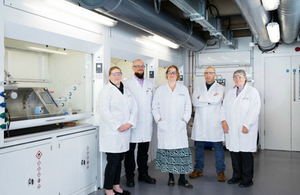ICoNiChem: recycling rare materials in electric vehicles
The Industrial Strategy Challenge Fund is supporting work to improve recycling in the UK electric vehicle industry so cars can be powered more sustainably.

The project team led by Paul Croft at ICoNiChem and Emma Kendrick of WMG.
The electric vehicle industry is already growing rapidly, and with the UK government’s plan to end the sale of new conventional petrol and diesel cars by 2040, the market is only set to grow.
In turn, demand for critical elements such as cobalt, nickel, manganese, lithium and graphite, commonly used in the production of electric vehicle batteries, will also rise.
Cobalt salts producer, ICoNiChem Widnes is leading a project to embed recycling and reuse of materials in the electric vehicle supply chain - and tackle some of the problems associated with the sourcing and use of these elements.
Fully realise the UK’s green ambitions
Paul Croft, Operations Director at ICoNiChem, says:
We believe the UK needs to move towards a circular economy to fully realise the green ambitions of electric vehicles.
The circular economy puts recycling and remanufacture at the centre of production, minimising waste and putting materials back into the supply chain.
Paul continues:
Batteries don’t last forever, and with a lifetime of 8 to 10 years, there will be a lot of waste developed.
If we don’t, as a country, consider what to do with that waste, then [electric vehicles] won’t be as green as we think.
ICoNiChem is working alongside the research organisation, Warwickshire Manufacturing Group (WMG), and others, in a recycling and reuse project through the Industrial Strategy Challenge Fund’s Faraday battery challenge.
Why reuse of materials is important
Lithium-ion batteries, widely used in consumer electronics, now feature heavily in modern electric vehicles. These generally include a lithium cobalt oxide cathode and a graphite anode.
Both these elements need to be mined from the earth, which is an environmental issue due to their finite resource. It’s also a political concern due to the presence of these mines in countries that often have less stringent safety legislation.
To reduce the impact and support sustainability, recycling of the materials is an obvious solution. However, this isn’t currently done within the UK’s electric vehicle supply chain.
Dr Emma Kendrick, former Materials Chemist at WMG and now Chair of Energy Materials, School Metallurgy and Materials, University of Birmingham says:
Currently our batteries are shipped over to Europe and a lot of those materials, which are on the critical elements and strategic materials list, are lost.
Though the rare and mined materials used in batteries are of critical importance, the entire recycling of the battery will be looked at.
Recycling over and over again
ICoNiChem is playing a leading role in the project due to it being the only cobalt salt producer in the UK. It also has expertise and experience in reprocessing and recycling cobalt, manganese and nickel.
Paul says:
All of the tests show that the recycled materials are identical to those made from virgin sources, so theoretically there is no reason why you couldn’t recycle over and over again.
Environmental and cost benefits
The benefits of the project will be environmental and cost-based, as recycling these materials and constructing a UK-based supply chain will bring down the price of batteries.
Emma concludes:
We’re maximising what the UK can provide in terms of materials and technology, bringing them into the UK economy in a growing industry.
Project funding from the £246 million Faraday battery challenge - which aims to develop new battery technologies for electric vehicles - is delivered by Innovate UK and the Engineering and Physical Sciences Research Council, both part of UK Research and Innovation.
Updates to this page
-
First published.